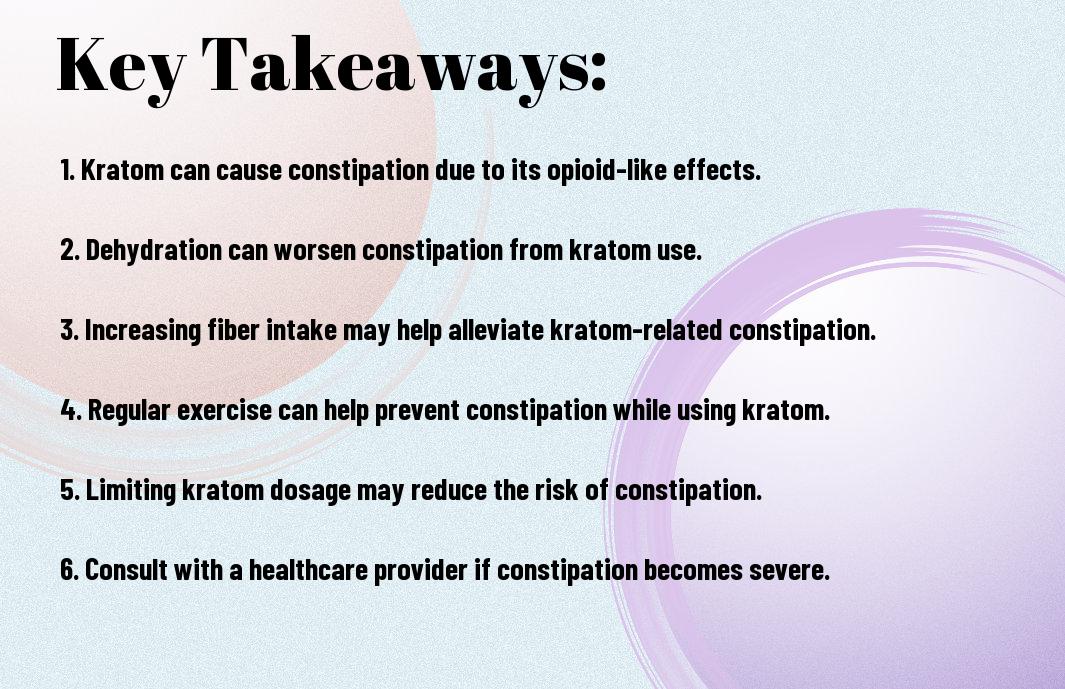Cause and effect are crucial when examining whether kratom contributes to constipation. Dive into the complexities of this topic to understand the relationship between kratom use and digestive health. Let’s unravel the mysteries behind kratom’s potential impact on bowel movements and explore ways to mitigate any discomfort. Stay informed and make educated choices about using kratom to promote overall well-being.
Key Takeaways:
- Kratom can cause constipation: Kratom’s opioid-like properties can slow down the digestive system, leading to constipation in some users.
- Hydration and dietary changes can help: Drinking plenty of water and incorporating fiber-rich foods into your diet can help alleviate constipation symptoms caused by kratom use.
- Consult a healthcare provider: If you experience persistent constipation while using kratom, it’s important to seek advice from a healthcare provider to address any potential concerns.

What is Kratom?
Before submerging into the question of whether kratom causes constipation, it’s important to understand what kratom is and its background. Kratom, scientifically known as Mitragyna speciosa, is a tropical evergreen tree native to Southeast Asia. It belongs to the coffee family and has been used traditionally for various medicinal purposes in countries like Thailand, Malaysia, and Indonesia.
Origins and History
Origins: Kratom has a rich history dating back centuries in Southeast Asia, where it was traditionally chewed, brewed into tea, or used in cooking to help with fatigue relief and manage pain.
Chemical Composition
Composition: Kratom contains over 40 compounds, with the two main active alkaloids being mitragynine and 7-hydroxymitragynine. These alkaloids interact with opioid receptors in the brain, producing a range of effects that can vary depending on the strain and dosage consumed.
Understanding the chemical composition of kratom is crucial in grasping its potential effects on the body, including the controversial topic of whether it can lead to constipation.
History: Kratom has gained popularity in Western countries in recent years for its purported pain-relieving and mood-boosting properties. However, its legal status and safety profile have been subjects of debate and scrutiny.
The Connection Between Kratom and Constipation
You may be wondering about the relationship between kratom and constipation. Let’s explore into the science behind how kratom affects the digestive system and its potential link to constipation.
The Opioid Receptors
For those unfamiliar with kratom, it’s a plant that contains compounds known as alkaloids, which interact with opioid receptors in the brain. This interaction can lead to pain relief and feelings of relaxation. However, it can also impact the gastrointestinal tract, potentially causing constipation.
The Gut-Brain Axis
Opioid receptors are not only found in the brain but also in the gut, playing a role in regulating gut motility. When kratom interacts with these receptors in the gastrointestinal tract, it can slow down the movement of food through the intestines, leading to constipation.
Opioid-induced constipation is a well-documented side effect of opioid drugs, and kratom’s impact on opioid receptors may similarly contribute to digestive issues like constipation.
Understanding the connection between kratom and constipation is crucial for individuals who use kratom and may experience gastrointestinal side effects. It’s necessary to be aware of the potential effects of kratom on the gut-brain axis and take necessary precautions to maintain digestive health. If you’re experiencing persistent constipation or other concerning symptoms while using kratom, it’s important to consult with a healthcare provider for guidance and support.

How Kratom Affects Digestion
For individuals wondering about the effects of kratom on digestion, it’s vital to understand how this herb interacts with the gastrointestinal system. Kratom has a complex relationship with digestion, impacting various aspects of gastrointestinal function.
Slowing Down Gut Motility
On one hand, kratom is known to slow down gut motility, which refers to the movement of food and waste through the digestive tract. This can lead to constipation in some users, as the slower transit time allows for more water absorption in the intestines, resulting in firmer stools that are difficult to pass.
Increasing Water Absorption
Absorption
On the other hand, kratom can also increase water absorption in the intestines, contributing to the constipation reported by some users. When excess water is reabsorbed from the stool, it can become dry and difficult to pass, leading to constipation and discomfort.
Increasing water absorption can have negative effects on digestive health, leading to dehydration and potential complications. It’s vital for individuals using kratom to stay well-hydrated and monitor their bowel movements to prevent constipation and other gastrointestinal issues.
Factors Contributing to Constipation
Not every individual experiences constipation when using kratom, but there are several factors that can contribute to this side effect. Here are some of the main factors to consider:
- Dosage and Frequency: Anytime a higher kratom dosage is consumed or the frequency of use is increased, the risk of constipation also rises. The higher the amount of kratom taken, the more likely it is to cause digestive issues such as constipation. Regular and excessive use can disrupt the normal functioning of the digestive system, leading to constipation.
- Individual Tolerance and Sensitivity: Sensitivity to kratom can vary from person to person. Some individuals may be more prone to experiencing constipation due to their unique physiological makeup. Factors such as metabolism, overall health, and genetics can play a role in how kratom affects each individual.
Dosage and Frequency
Any changes in the dosage or frequency of kratom consumption can impact the likelihood of constipation. It is important to monitor your intake and be mindful of how your body reacts to different doses. Adjusting the amount of kratom consumed and spacing out your doses can help alleviate digestive issues.
Individual Tolerance and Sensitivity
Sensitivity to kratom varies among users, and some individuals may be more prone to constipation due to their unique physiology. Factors such as metabolism, overall health, and genetic makeup can influence how kratom affects each person. It is necessary to pay attention to your body’s signals and adjust your kratom consumption accordingly to minimize the risk of constipation.
Managing Constipation While Taking Kratom
After reading A Critical Review of the Neuropharmacological Effects …, it’s important to address any potential constipation issues that may arise while using kratom. Here are some strategies to help manage constipation symptoms:
Hydration and Fiber Intake
Intake of an adequate amount of water and fiber is crucial for maintaining healthy bowel movements. Dehydration can worsen constipation, so be sure to drink plenty of fluids throughout the day. Additionally, incorporating fiber-rich foods such as fruits, vegetables, and whole grains into your diet can help promote regularity.
Exercise and Physical Activity
To help alleviate constipation while taking kratom, it is important to engage in regular exercise and physical activity. Physical movement can stimulate bowel function and promote smoother digestion. Whether it’s going for a brisk walk, practicing yoga, or hitting the gym, finding ways to stay active can make a significant difference in managing constipation.
Another important aspect to consider is the potential gastrointestinal effects of kratom. While kratom may cause constipation in some individuals, others may experience diarrhea. It is important to monitor how your body responds to kratom and make adjustments to your diet and lifestyle as needed to promote digestive health.
Can Kratom Withdrawal Cause Constipation?
Yes, kratom withdrawal can cause constipation among other symptoms. Many individuals have reported their experiences with kratom withdrawal on reddit, sharing their struggles with physical and psychological side effects. Constipation is a common issue that can arise when discontinuing kratom use, adding another layer of discomfort to the withdrawal process.
Alternative Solutions for Constipation Relief
Probiotics and Prebiotics
Unlike some harsh laxatives, probiotics and prebiotics offer a gentle approach to promoting healthy digestion. These supplements contain beneficial bacteria and fibers that help restore the natural balance of your gut microbiota. An imbalance in gut bacteria can contribute to constipation, so incorporating probiotics and prebiotics into your daily routine can help regulate bowel movements and alleviate discomfort.
Natural Laxatives and Stool Softeners
Any individual experiencing constipation can benefit from incorporating natural laxatives and stool softeners into their diet. Options such as prunes, flaxseeds, and aloe vera juice are known for their ability to promote regularity and soften stools for easier passage. These natural remedies are gentle on the digestive system and can provide effective relief without the harsh side effects often associated with chemical laxatives.
Probiotics and prebiotics play a crucial role in maintaining gut health and supporting regular bowel movements. By replenishing and nurturing the good bacteria in your digestive system, you can improve overall digestion and reduce the likelihood of experiencing constipation. Incorporating foods rich in probiotics, such as yogurt, kefir, and sauerkraut, can help support a healthy gut microbiome and alleviate constipation symptoms.
To wrap up
With these considerations in mind, it is important to note that while kratom may cause constipation in some individuals, there are steps that can be taken to alleviate this issue. By staying hydrated, incorporating fiber-rich foods into your diet, and managing your dosage of kratom, you may be able to reduce the likelihood of experiencing constipation as a side effect of using this botanical substance.
Overall, it is crucial to listen to your body, be mindful of your kratom intake, and prioritize your overall health and well-being. If you are experiencing persistent constipation or any other concerning side effects while using kratom, it is important to consult with a healthcare professional for guidance and support.
FAQ
Q: What is kratom?
A: Kratom is a tropical tree native to Southeast Asia, known for its leaves which have been used for traditional medicine purposes for centuries.
Q: Does kratom cause constipation?
A: Yes, kratom can cause constipation as a common side effect. It affects the digestive system and can slow down bowel movements.
Q: How does kratom cause constipation?
A: Kratom contains alkaloids that bind to opioid receptors in the digestive system, leading to decreased gastrointestinal motility and potentially causing constipation.
Q: What are the symptoms of constipation from kratom use?
A: Symptoms of constipation from kratom use may include infrequent bowel movements, difficulty passing stools, abdominal discomfort, bloating, and a feeling of incomplete evacuation.
Q: How can constipation from kratom be managed or prevented?
A: Constipation from kratom can be managed or prevented by staying hydrated, eating a fiber-rich diet, exercising regularly, using stool softeners if needed, and taking regular breaks from kratom use.









